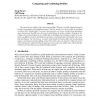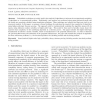204 search results - page 15 / 41 » Proposition-valued random variables as information |
JILP
2000
13 years 7 months ago
2000
How much do two profiles of the same program differ? When has a profile changed enough to warrant reexamination of the profiled program? And how should two or more profiles be com...
JCST
2010
13 years 2 months ago
2010
Probabilistic techniques are widely used in the analysis of algorithms to estimate the computational complexity of algorithms or a computational problem. Traditionally, such analys...
POPL
2003
ACM
14 years 7 months ago
2003
ACM
We present a new polynomial-time randomized algorithm for discovering affine equalities involving variables in a program. The key idea of the algorithm is to execute a code fragme...
TIP
2008
13 years 7 months ago
2008
This paper presents recursive cavity modeling--a principled, tractable approach to approximate, near-optimal inference for large Gauss-Markov random fields. The main idea is to su...
KDD
2003
ACM
14 years 8 months ago
2003
ACM
Two-dimensional contingency or co-occurrence tables arise frequently in important applications such as text, web-log and market-basket data analysis. A basic problem in contingenc...


